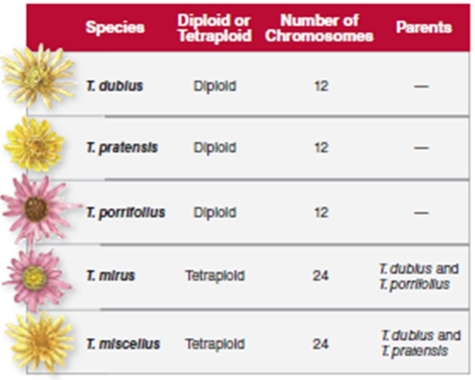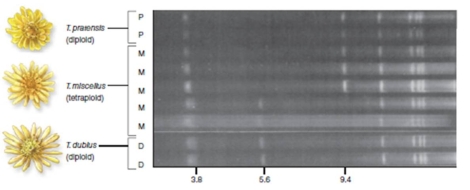A) Interphase one
B) Metaphase two
C) Prophase one
D) Metaphase one
E) Prophase two
G) A) and B)
Correct Answer

verified
Correct Answer
verified
Multiple Choice
Genes A and B are on the same chromosome.If a person has one chromosome with the alleles AB and a second chromosome with the alleles ab,how could they produce a gamete with a chromosome containing the alleles Ab or aB?
A) Independent assortment
B) Random fertilization
C) Mitosis
D) Fragmentation of the chromosome
E) Crossing over
G) B) and E)
Correct Answer

verified
Correct Answer
verified
Multiple Choice
A diploid germ cell reduces its chromosome number by half to generate four haploid nuclei in:
A) Fertilization
B) Mitosis
C) Meiosis
D) Replication
E) Parthenogenesis
G) A) and D)
Correct Answer

verified
Correct Answer
verified
Multiple Choice
If a haploid cell goes through mitosis it will generate:
A) Two haploid cells
B) Two diploid cells
C) Four haploid cells
D) Four diploid cells
E) This isn't possible
G) B) and D)
Correct Answer

verified
Correct Answer
verified
Multiple Choice
In meiosis,homologous chromosomes separate during:
A) Prophase one
B) Prophase two
C) Anaphase one
D) Metaphase one
E) Anaphase two
G) B) and D)
Correct Answer

verified
Correct Answer
verified
Multiple Choice
Nondisjunction may cause:
A) Trisomy 21
B) Turner Syndrome
C) Jacobs Syndrome
D) All are correct
E) Klinefelter syndrome
G) B) and C)
Correct Answer

verified
Correct Answer
verified
Multiple Choice
People who have a single X chromosome are female,while those with XXY sex chromosomes are males.In order to be a female a human:
A) Must have two X chromosomes
B) Cannot have a Y chromosome
C) Must have one X chromosome
D) Must have one Y chromosome
E) Cannot have an X chromosome
G) A) and D)
Correct Answer

verified
Correct Answer
verified
Multiple Choice
Meiosis is a process that produces:
A) Sperm cells
B) Egg cells
C) Gametes
D) Haploid cells
E) All are correct
G) B) and C)
Correct Answer

verified
Correct Answer
verified
Multiple Choice
In humans,germ cells are located in the:
A) Ovaries and bone marrow
B) Bone marrow
C) Testes
D) Ovaries
E) Testes and ovaries
G) B) and D)
Correct Answer

verified
Correct Answer
verified
True/False
Identical twins result from a single fertilization to form a zygote,which then clones itself.
B) False
Correct Answer

verified
Correct Answer
verified
Multiple Choice
In plants,haploid gametophytes produce gametes by:
A) Meiosis
B) Mitosis
C) Fertilization
D) Sporulation
E) Non-disjunction
G) A) and E)
Correct Answer

verified
Correct Answer
verified
True/False
Without genetic diversity,a population might more easily fall victim to parasites and pathogens.
B) False
Correct Answer

verified
Correct Answer
verified
Multiple Choice
Figure 9.19  -Based on Figure 9.19,T.mirus would normally produce gametes with __ chromosomes.
-Based on Figure 9.19,T.mirus would normally produce gametes with __ chromosomes.
A) 24
B) 12
C) 6
D) 2
E) 1
G) C) and D)
Correct Answer

verified
Correct Answer
verified
Multiple Choice
Figure 9.20  -Based on Figure 9.20,T.mirus has:
-Based on Figure 9.20,T.mirus has:
A) Arisen only once with T. pratensis being the female parent
B) Arisen only once with T. dubius being the female parent
C) Arisen more than once with T. pratensis and T. dubius both being the female parent
D) Arisen more than once with T. pratensis being the female parent
E) Arisen more than once with T. dubius being the female parent
G) A) and B)
Correct Answer

verified
Correct Answer
verified
True/False
The number of chromosomes in a daughter cell produced by mitosis is the same as the number of chromosomes in the parent cell.
B) False
Correct Answer

verified
Correct Answer
verified
Multiple Choice
When a woman's egg ovulates it arrests in metaphase II until it is fertilized by a sperm.How many chromosomes will be present in the egg?
A) 46
B) 2
C) 4
D) 23
E) 1
G) B) and E)
Correct Answer

verified
Correct Answer
verified
Multiple Choice
The X chromosome is:
A) Larger than the Y chromosome
B) Smaller than the Y chromosome
C) The same size as the Y chromosome
D) Genetically identical to the Y chromosome
E) Both A and D are correct
G) A) and C)
Correct Answer

verified
Correct Answer
verified
Multiple Choice
Alternate forms of the same gene:
A) Do not exist
B) Are alleles
C) Are homologs
D) Are sister chromatids
E) Do not occur in the same individual
G) A) and D)
Correct Answer

verified
Correct Answer
verified
Multiple Choice
The chromosomal designation for a human male is:
A) XX
B) XO
C) XY
D) YY
E) XXX
G) C) and D)
Correct Answer

verified
Correct Answer
verified
True/False
The number of chromosomes in a daughter cell produced by meiosis is the same as the number of chromosomes in the parent cell.
B) False
Correct Answer

verified
Correct Answer
verified
Showing 41 - 60 of 81
Related Exams